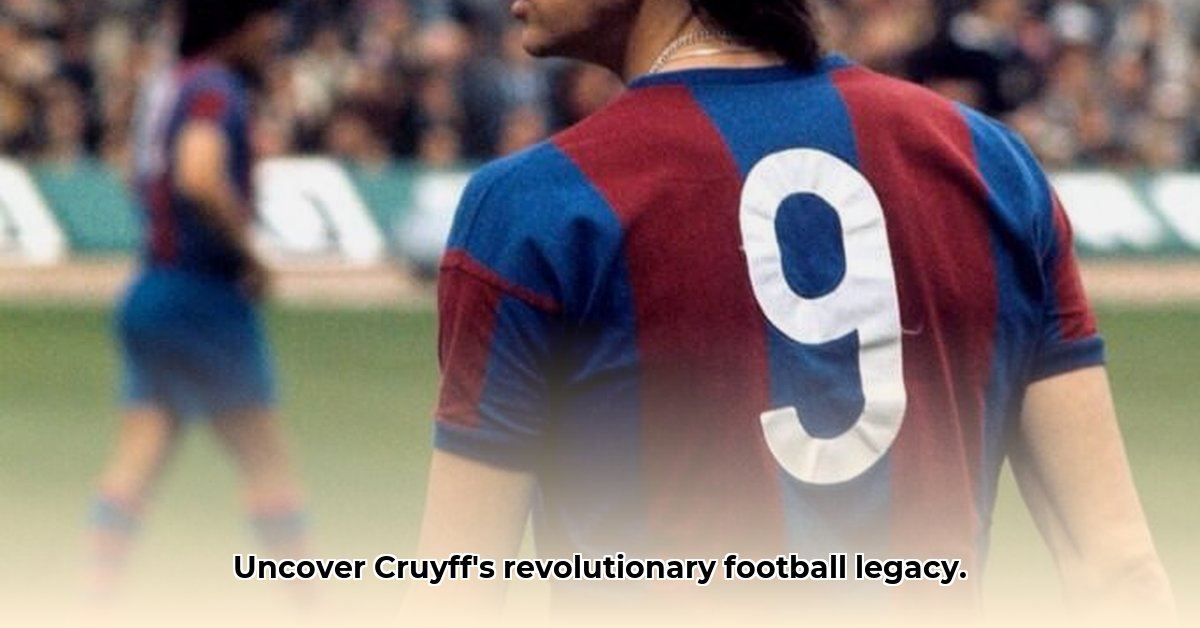Johan Cruyff. The name evokes magic, conjuring images of stunning goals and brilliant plays that redefined football. This biography delves into the life of this legend, exploring his evolution as a revolutionary player and coach, his impact on Barcelona, his humanitarian work, and his enduring influence. We’ll trace his journey from Amsterdam to global icon, examining his innovative ideas, his Barcelona era, and the significance of his philanthropy. Discover the complete story of a man who transcended football – a symbol of innovation, resilience, and a lasting legacy.
Cruyff: Beyond the Pitch
From Amsterdam’s Streets to Global Icon
Johan Cruyff’s story is one of overcoming adversity and achieving greatness. Born in Amsterdam, he faced hardship with the early loss of his father, Hermanus, in 1959. This fueled his unwavering drive. Ascending through the ranks of Ajax, he showcased a unique style of play, a fusion of skill, vision, and strategy, nicknamed: “Total Football.”
His rise began at age 10 when he joined the Ajax youth system. Cruyff’s father’s death had a profound impact on his mentality. His mother began working at Ajax as a cleaner after the death of his father. He made his first team debut on November 15, 1964, against GVAV. By the 1965–66 season, he was a regular first-team player.
His playing style, “Total Football,” was a revolutionary shift. Players moved fluidly, seamlessly interchanging positions, with the team operating as a cohesive unit. It was about collective brilliance, a dance of skill and strategy. Cruyff orchestrated this approach, transforming the game and inspiring players.
The Barcelona Years: A Cultural Embrace
His move to Barcelona in 1973, for a world-record transfer fee, represented a cultural embrace. Cruyff chose the Catalan name “Jordi” for his son, demonstrating his connection to the community. He became a symbol of Catalonia, a cherished icon. His time with Barcelona created memories that resonate with fans. It went beyond statistics; he touched the hearts of fans.
During his time at Barcelona, in a game against Atlético Madrid, Cruyff scored a goal in which he leapt into the air and kicked the ball past Miguel Reina in the Atlético goal with his right heel. In 1978, Barcelona defeated Las Palmas 3–1, to win the Copa del Rey. Cruyff played two games with Paris Saint-Germain in 1975 during the Paris tournament.
The “Cruyff Turn”
The “Cruyff Turn,” a simple yet brilliant maneuver, embodies his genius. This sudden change of direction – a twist that left defenders bewildered – highlights his ball control and ability to anticipate opponents. It was improvisation, a testament to his creative mind.
From the Pitch to the Sidelines
Cruyff brought his innovative style to Ajax and Barcelona, coaching teams to play an attacking game and nurturing young players. His coaching success mirrored his playing achievements. He created the Johan Cruyff Institute to teach sports management and dedicated himself to helping children play sports.
In 1988, Cruyff returned to Barcelona as a coach. Known for his visionary approach, he instilled a philosophy centered on possession-based, attacking football. One of his most notable achievements was assembling the “Dream Team,” a squad featuring talents like Pep Guardiola, Michael Laudrup, and Hristo Stoichkov. This team dominated Spanish football in the early 1990s, winning four consecutive La Liga titles from 1991 to 1994. In 1992, Cruyff led Barcelona to its first-ever European Cup triumph, defeating Sampdoria in the final at Wembley Stadium.
A Legacy of Inspiration
Cruyff’s influence is undeniable. His playing style is discussed and emulated. His coaching achievements are legendary, and his philanthropic work showcases his character. He was a visionary leader and a humanitarian. Cruyff’s impact extends beyond the soccer field, touching culture and society. His life story is a reminder that greatness is defined by success and the positive impact we have on others.
Cruyff’s Impact: A Detailed Look
| Area of Influence | Specific Details | Lasting Effects |
|---|---|---|
| Revolutionary Playing Style | “Total Football,” characterized by fluid movement, positional interchange, and collective creativity; “Cruyff Turn.” | Continues to influence tactical approaches in modern football; remains iconic and instantly recognizable. |
| Coaching Prowess | Developed young players, implemented attacking philosophies at Ajax and Barcelona; highly successful managerial career. | Many successful managers credit him as an inspiration; inspired a generation of playing styles across multiple leagues. |
| Philanthropic Endeavors | Founded the Johan Cruyff Institute; focused on providing sports opportunities for underprivileged children. | Created lasting educational opportunities; made significant contributions to youth sports and community development. |
| Cultural Icon | Transcended sport to become a symbol of Catalan identity and a globally admired figure. | Remains a beloved figure; his legacy continues to inspire worldwide respect and admiration. |
The study of Cruyff’s impact is ongoing. Experts acknowledge his influence on the game, with further research needed to understand his long-term effects on professional football and societal issues.
Johan Cruyff’s Early Life and the Shaping of a Philosophy
Key Takeaways:
- Cruyff’s life in Amsterdam shaped his footballing philosophy and philanthropic endeavors.
- His experiences fostered a belief in self-reliance, innovation, and collective effort, tenets of “Total Football.”
- His dedication to developing young players reflected his journey from humble beginnings, emphasizing the importance of nurturing talent.
- Cruyff’s philanthropic work stemmed from a desire to uplift others and provide opportunities similar to those that enabled his success.
From Amsterdam Streets to Global Icon
Johan Cruyff navigated the streets of Amsterdam, instilling in him a determination that defined his approach to the game. Resilience was reflected in his innovative style of play. His early life shaped his football philosophy and philanthropy.
Born in Amsterdam on April 25, 1947, Hendrik Johannes Cruijff, later known worldwide as Johan Cruyff, grew up near Ajax’s stadium. His father’s death in 1959 significantly impacted him. He joined Ajax’s youth system at age 10, displaying talent from an early age.
This period shaped his philosophy: “Total Football” wasn’t a tactical system; it was a reflection of his own journey—a collective effort where every player was vital, just like his own community.
Total Football: A Reflection of His Roots
Cruyff’s “Total Football” wasn’t merely tactical; it mirrored his life’s journey. Each player on the field, constantly moving, echoed his own relentless drive. It was a system demanding flexibility, creativity, and teamwork—qualities honed during his formative years. It was about the collective, a reflection of his community spirit. Ajax and Barcelona became a testament to this philosophy’s viability, proving his methods effective for developing talent and building dominant teams.
Philanthropy: Giving Back to the Community
Cruyff’s philanthropy was a continuation of his life’s theme. His commitment to nurturing young talents reflected his own path. He understood the transformative potential of opportunity, recognizing the importance of giving back to the community that supported him. From disadvantaged youth to global icon, he used his influence to create pathways for others to achieve their dreams.
Founded in 1997, the Cruyff Foundation supports projects focused on sports for children with disabilities and creating safe places for children to play sports.
A Lasting Legacy
Cruyff’s legacy extends beyond the football pitch, shaping a philosophy of athletic achievement and humanitarianism that inspires coaches, players, and philanthropists. It reminds us that hardship can forge resilience, and success can be used to uplift others. His life is a case study in how one’s formative years can shape their future impact on the world. Cruyff passed away on March 24, 2016, in Barcelona, leaving behind a legacy that continues to inspire.
Cruyff’s Philanthropic Endeavors and Societal Impact
Key Takeaways:
- Johan Cruyff’s impact extends beyond football.
- The Johan Cruyff Foundation uses sport to improve the lives of children, focusing on health, education, and social inclusion.
- Cruyff believed in the power of sport to empower individuals and communities.
- His philanthropic work has had a lasting impact on the lives of many children around the world.
The Johan Cruyff Foundation, established in 1997, embodies Cruyff’s commitment to social responsibility. The Foundation focuses on creating opportunities for children through sports, particularly those with disabilities or those living in challenging social circumstances.
The Cruyff Foundation operates various programs, including Cruyff Courts, small, safe pitches in urban neighborhoods, and Cruyff Foundation Community Program, which promotes social cohesion through sports-based activities.
- King Names For Boy To Crown Your Little One With Power - January 30, 2026
- Discover Names with Specific Meanings for Your Baby - January 29, 2026
- Explore Weird Gender Neutral Names That Truly Stand Out - January 28, 2026








